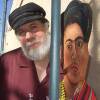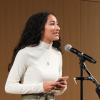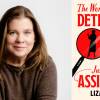Of course it was a poet who deemed April "the cruellest month." T.S. Eliot reflected on how "breeding lilacs out of the dead land, mixing memory and desire, stirring dull roots with spring rain.” Maybe he would have felt more charitable toward April had it been anointed National Poetry Month during his lifetime.
In celebration of poetry, GBH is profiling local poets every Friday of National Poetry Month. This week we’re profiling Porsha Olayiwola, a world poetry slam and national poetry slam champion, who sat down with Open Studio host Jared Bowen after she was appointed Boston's poet laureate in 2019, a term that lasts four years.
In her role as poet laureate, Olayiwola sees herself promoting the artform in the city through what she calls "radical love."
"I've been trying to take all the love I've been able to muster and figure out ways to deliver it via poetry through the city," she said.
Olayiwola said the process itself is an act of love. It's also deeply personal.
"The way I think about it is when people write poems, or produce any kind of art, it literally comes from the inside of a person. It’s from a thing that didn’t exist," she said. "I have to write this poem and I have to bring it outside of myself. Suddenly, I’m sharing it with the world. And when I do that, they get to see a bit of my inside, and vice versa.”
Olayiwola believes poetry can foster a connection that other art forms cannot.
“Language is our number one source of communication as human beings," she said. "Poets have to be very careful with word choice. We have to get as close as we possibly can to explain exactly is what it is that we mean. I think because we try to get that close, it creates a whole other level of intimacy.”
On the city of Boston’s website, Olayiwola describes her writing as a product of “a dangerous imagination.” She identifies as an Afro-futurist, and said she uses her poetry to play with magical realism and science fiction.
“I use it as a tool to solve issues of folks of color, especially when I tangle it with history and the darker parts of American history," she said. "For example, I have a poem where I imagine a world where no one says the N-word. I think that some people would think that was dangerous to create an alternate world. Simultaneously, it's a world that is free of microaggressions.”
Olayiwola, who comes from a spoken word background, said it’s one thing to conceptualize how her words might look on the page and an entirely different thing to actually vocalize her work.
"When I’m performing, I try not to think about the room, the floor, what I'm wearing. I don't even think about the poem. I try to think about the word that's coming out of my mouth in that exact moment — and only that word. “
She sees her appointment as the city’s poet laureate as an affirmation of the direction poetry is moving in.
"There are so many types of poetry," she said. "The canon is completely shifting. It’s like classical music suddenly integrating hip-hop or something. A lot of folks shaping the canon are from a traditionally spoken word background.”
Like many people, Olayiwola was introduced to poetry through that classical lens. Though she's part of the movement to broaden and shift the artform, she understands why students may not connect with poetry the first time they encounter it.
“Most people interact with poetry when they're in eighth grade and they are forced to remember a poem for school ... Robert Frost's 'Two roads diverged ...' I think why would my teachers make me read that, and memorize it and then recite it?" she said. "I didn't really conceptualize that until I was memorizing and reading my own work, and how close I feel to the work. It becomes like a spiritual experience for me."
Now an established poet in her own right, how does Olayiwola feel about Frost?
“I’m embarrassed to admit it. I like all poets now. I read a poem and I say, 'What can I take from this?' Or 'What is this poet teaching me?' 'What is this poem doing that I love?' And if it's not doing anything I love, what is it doing that I don't like? And how can I learn from that?”






